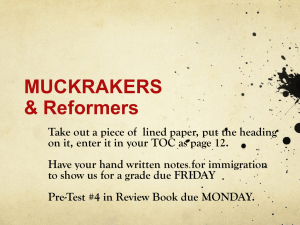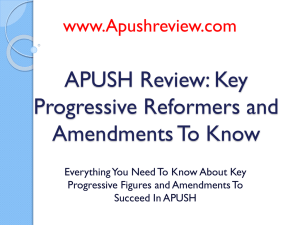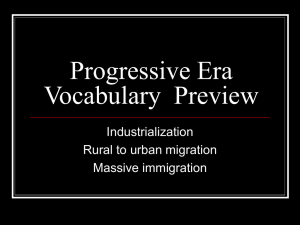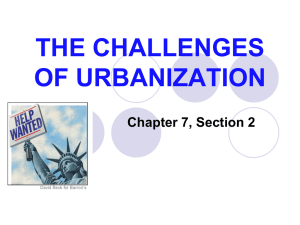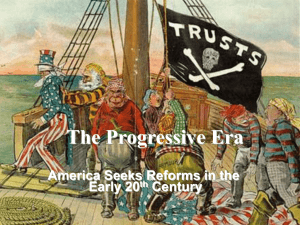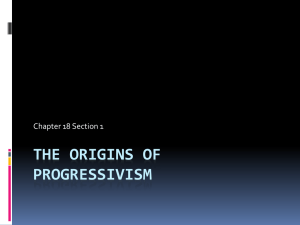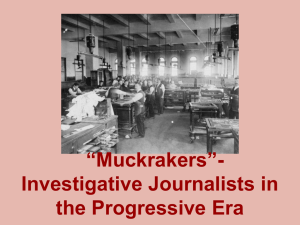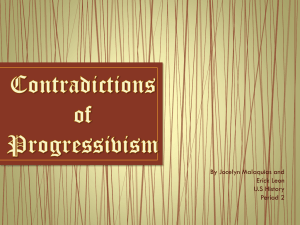Muckrakers, philanthropists, reformers, and zealots… …how
advertisement
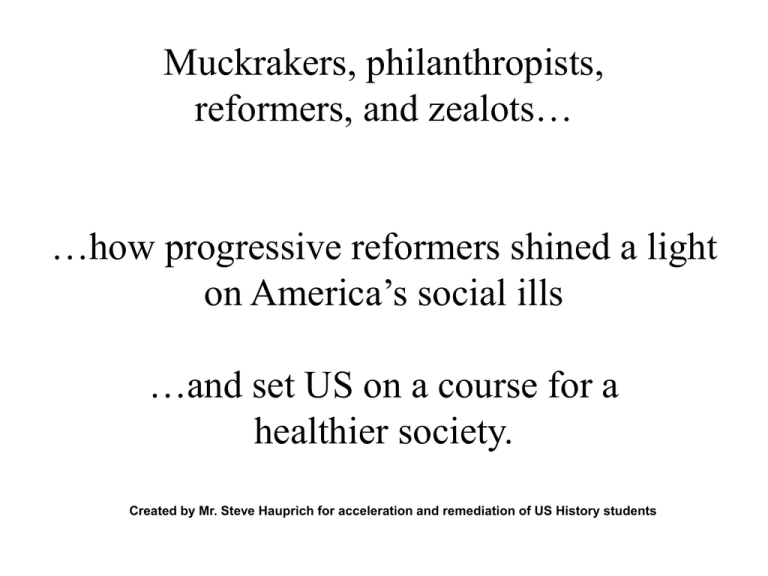
Muckrakers, philanthropists, reformers, and zealots… …how progressive reformers shined a light on America’s social ills …and set US on a course for a healthier society. Created by Mr. Steve Hauprich for acceleration and remediation of US History students “Power tends to corrupt; absolute power corrupts absolutely.” -Lord Acton…British Historian “Money, get back, I’m alright Jack, keep your hands off my stack” -pink floyd “The public be damned.” - William H. Vanderbilt Journalists use 1st Amendment rights to show how power is at times abused… M U C K R A K E R s “Money…it’s a crime…share it fairly, but don’t take a slice of my pie” -pink floyd Reformers were most concerned with the problems of oppressive poverty and political corruption …seeing root causes of greed and ignorance …Solutions for society’s problems would require massive campaigns for democratic reforms, government intervention, and civic duty. Jacob Riis was a great Muckraker… photojournalism depicting scenes of abject poverty …NY City… How The Other Half Lives … “If wishes were horses, then beggars would ride.” - children’s nursery rhyme Will the US Congress go forward with massive cuts to food assistance programs for the US poor in time for Christmas? Jane Addams may have been America’s greatest reformer of The Progressive Era… as she led a crusade to help the poor via her settlement houses and worked for justice helping establish the NAACP. Settlement Houses were charitable places where people were taught important basic life skills for economic and social improvement. men and women would join the NAACP to encourage civic duty and greater social equality in a progressive Era that largely ignored the injustices for minorities. These W.E.B. DuBois was an important leader in the NAACP. Although from an earlier time in US History… Dorothea Dix was a role model for future reformers in the Progressive Era …her campaign in Massachusetts won reforms to help the physically and mentally disabled. Likewise… Elizabeth Cady Stanton, Susan B. Anthony, and Lucretia Mott would campaign for justice throughout their lives. “We hold these truths to be self evident: that all men and women were created equal” -1848 Women’s Rights Convention Carrie Chapman Catt & Alice Paul led the Women’s Suffrage Movement to their Great Victory … the 19th Amendment in 1920. President Theodore Roosevelt would gain a reputation for standing up against the power of greedy monopolists. Andrew Carnegie and John D. Rockefeller did not want to be remembered as robber barons …they instead became great Philanthropists Carnegie built numerous libraries in all size cities across the USA…creating learning opportunities for greater social mobility. The Rockefeller Foundation and Rockefeller Center were established to foster greater creativity and promote enterprise. Bill and Melinda Gates have already given $23.5 Billion to charity… the philanthropy example is followed… In a later time other reformers would build on the progress initiated by these earlier reformers…appealing to America’s great conscience. ___1. The works of Jacob Riis and Upton Sinclair exposed the problems associated with 1 poverty among Native American peoples 2 rapid industrialization and urbanization 3 segregation of public facilities in the South 4 colonial expansion in Asia ___2. Jacob Riis, in How the Other Half Lives, and Lincoln Steffens, in The Shame of the Cities, contributed to reform movements in the United States by (1) exposing poverty and corruption (2) opposing westward expansion (3) criticizing racial injustice (4) supporting organized labor “Jane Addams Opens Hull House” “Jacob Riis Photographs Tenement Residents” “Ida Tarbell Exposes Standard Oil Company” ___3. These headlines represent efforts by individuals to (1) support business monopolies (2) improve depressed urban areas (3) solve problems of American farmers (4) correct abuses of the Industrial Revolution ___4. Dorothea Dix, Jane Addams, and Jacob Riis were all known as (1) muckrakers (2) suffragettes (3) political leaders (4) social reformers Speaker A: “When demand ran high, and markets were scarce, he showed little mercy, broke his contracts for delivery and raised prices.” Speaker B: “The man of wealth must hold his fortune ‘in trust’ for the community and use it for philanthropic and charitable purposes.” Speaker C: “It is cruel to slander the rich because they have been successful. They have gone into great enterprises that have enriched the nation and the nation has enriched them.” Speaker D: “The fruits of the toil of millions are boldly stolen to build up colossal fortunes for the few, unprecedented in the history of mankind.” ___5. Which two speakers would most likely label late 19th-century industrialists as robber barons? (1) A and B (2) A and D (3) B and C (4) C and D ___6. The most valid conclusion that can be drawn from the different viewpoints of these speakers is that industrialists of the late 19th century (1) benefited and harmed society (2) treated their workers fairly (3) used illegal means to gain wealth (4) generally opposed the free-enterprise economic system ___7. Passage of the Pure Food and Drug Act and the Meat Inspection Act illustrated the federal government’s commitment to (1) environmental conservation (2) workers’ rights (3) business competition (4) consumer protection ___8. What was a significant impact of the Progressive movement on American life? (1) increased government regulation of business (2) increased restrictions on presidential powers (3) decreased influence of the media on public policy (4) reduced government spending for social programs ___9. What is the main idea of this cartoon? (1) Big business greatly influenced the actions of the Senate. (2) The Senate had to continue to pass legislation to support conservation efforts. (3) The Senate needed more financial support from monopolies. (4) Relations between industry and the Senate benefited the general public. ___10. The reforms advocated by the Progressive movement were intended mainly to 1 expand the civil rights of African America and Native American Indians 2 reduce restrictions on immigration 3 increase the spirit of patriotism throughout the nation 4 promote political and economic change through government intervention ___11. The initiative, referendum, and recall election were supported by the Progressives as ways to (1) limit government regulation of the press (2) limit the role of the Supreme Court in constitutional issues (3) increase citizen participation in the political process (4) increase the influence of major political parties ___12. Which heading best completes the partial outline below? I.________________ A. Secret ballot B. Direct election of senators C. Recall D. Referendum (1) Checks and Balances (2) Unwritten Constitution (3) Progressive Reforms (4) Universal Suffrage Speaker A: The [African American] demands equality, political equality, industrial equality, and social equality; and he is never going to be satisfied with anything less. Speaker B: Equal but separate accommodations for the white and colored races is for the preservation of the public peace and good order. Speaker C: Vocational training will provide the means for African Americans to gain the civil liberties they deserve. Speaker D: The best answer for the equality of the [African American] lies in a return to his homeland in Africa. ___13. Which speaker most strongly agrees with the beliefs of W. E. B. Du Bois? (1) A (3) C (2) B (4) D ___14. Which speaker would most likely support the Jim Crow laws that emerged in the 1890s? (1) A (3) C (2)B (4) D. “I have a dream that one day this nation will rise up and live out the true meaning of its creed: ‘We hold these truths to be self-evident; that all men are created equal.“’ -Martin Luther King, Jr. Washington, D.C., 1963 ___15. Which step was taken following this speech to advance the dream of Martin Luther King, Jr.? (1) desegregation of the Armed Forces (2) ruling in Plessy v. Ferguson (3) elimination of the Ku Klux Klan (4) passage of new civil rights acts •“Rachel Carson’s Silent Spring Warns of Environmental Dangers” •“Ralph Nader Sounds Warnings for Consumer Safety” ___16. Rachel Carson and Ralph Nader are similar to the muckrakers of the Progressive Era because they have (1) advocated a total change in the structure of government (2) attempted to expose societal problems (3) failed to influence public opinion (4) supported anti-American activities
